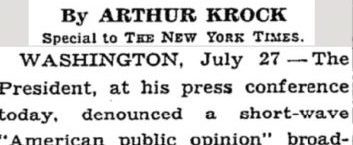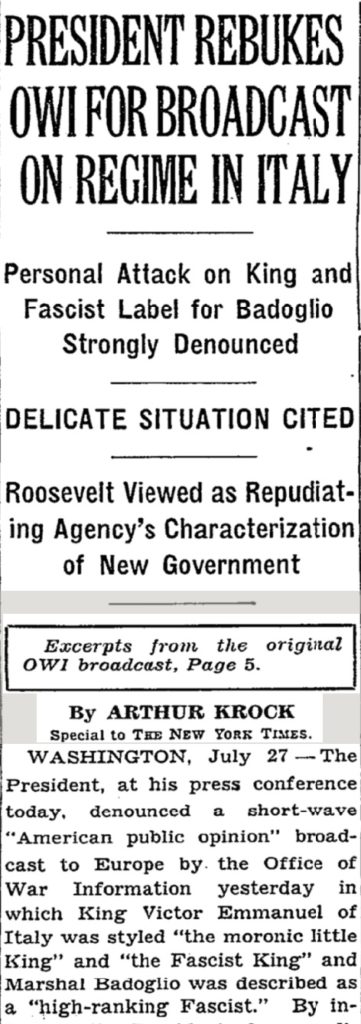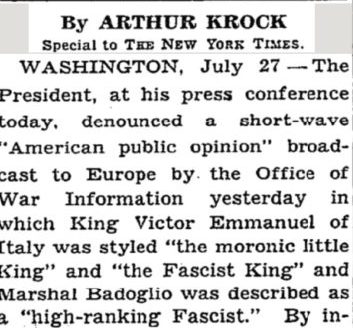
In 1943, in the middle of the war, the U.S. Congress almost completely de-funded domestic propaganda programs of the Office of War Information (OWI), which also managed Voice of America (VOA) radio broadcasts for overseas audiences, although at that time they aired under various names. When VOA officials and journalists took their pro-Moscow zeal too far and in their broadcasts abroad threatened a critical U.S. diplomatic initiative in Italy because Communists voiced their objections, President Roosevelt made a rare public statement designed to bring a measure of control and limit foreign propaganda interference in U.S. foreign and information policy. On July 28, 1943, the New York Times published a front-page report by its Washington correspondent and bureau chief Arthur Krock under the headline: “President Rebukes OWI for Broadcast on Regime in Italy.”

PRESIDENT REBUKES OWI FOR BROADCAST ON REGIME IN ITALY
Personal Attack on King and Fascist Label for Badoglio Strongly Denounced
By Arthur Krock for THE NEW YORK TIMES, July 27, 1943, published July 28, 1943, Pages 1 and 5.
WASHINGTON, July 27 — The President, at his press conference today, denounced a short-wave “American public opinion” broadcast to Europe by the Office of War Information yesterday in which King Victor Emmanuel of Italy was styled “the moronic little King” and “the Fascist King” and Marshal Badoglio was described as a “high-ranking Fascist.”

PRESIDENT REBUKES OWI FOR BROADCAST ON REGIME IN ITALY
Personal Attack on King and Fascist Label for Badoglio Strongly Denounced
By Arthur Krock for THE NEW YORK TIMES, July 27, 1943, published July 28, 1943, Pages 1 and 5.
WASHINGTON, July 27 — The President, at his press conference today, denounced a short-wave “American public opinion” broadcast to Europe by the Office of War Information yesterday in which King Victor Emmanuel of Italy was styled “the moronic little King” and “the Fascist King” and Marshal Badoglio was described as a “high-ranking Fascist.”
John Houseman was already gone, but Soviet sympathizers and Communists hired by him to produce VOA broadcasts followed the Kremlin’s line that everyone in Italy except for Italian communists was either a Fascist or tainted by Fascism.
President Roosevelt, with input from General Eisenhower and the State Department, made a strategic decision, however, to work with Italy’s King Victor Emmanuel and Marshal Pietro Badoglio. His and General Eisenhower’s objective was to get Italy out of the alliance with Nazi Germany as quickly as possible, in the hope of shortening the war and limiting the losses of American and other allied troops.
On July 27, 1943, President Roosevelt said in reply to a question that neither he nor anybody else in his administration was consulted about the Voice of America broadcast. He added that “the broadcast should never had been made and that Mr. Sherwood [Robert E. Sherwood–Hollywood playwright, FDR’s speechwriter and the head of OWI’s Overseas Division where VOA broadcasts were produced] was taking vigorous steps by way of reprimand.”
With John Houseman already gone, several more pro-Kremlin sympathizers were fired, although their departure was also presented publicly at the time as being voluntary.
New York Times Washington bureau chief Arthur Krock who wrote the report provided an analysis of the management crisis within the agency in charge of the Voice of America broadcasts. The New York Times reporter noted that the OWI bureaucracy’s first explanation was that the Voice of America broadcast merely reflected American public opinion by quoting individuals opposed to “toleration of fascism” and to “any relaxation of … unconditional surrender.” It was a lie because one of the VOA commentators was an OWI official, James Warburg, writing under a pseudonym.
Arthur Krock wrote a harsh but accurate assessment for the New York Times readers that some of the officials in charge of the Voice of America and some of its journalists became agents of influence for the Kremlin through their willingness to accept and repeat Soviet propaganda to the detriment of U.S. national interest and national security.
The selections of opinions made by the OWI were drawn heavily from purely personal journalistic sources–otherwise undistinguished–which have opposed the President’s Vichy and North African policies and usually produce an “ideology” that conforms much more closely to the Moscow than to the Washington-London line.
The explanation [from OWI officials] also failed to deal with the high official view here that the New York shortwave department of the OWI [Voice of America] deliberately and constantly borrows from these sources to discredit the authorized foreign policy of the United States Government, or to reshape it according to the personal and ideological preferences of Communists and their fellow-travelers in this country.
Over his 60-year career, Arthur Krock won three Pulitzer Prizes. On April 22, 1970, he was presented with the Presidential Medal of Freedom by President Richard Nixon.
After leaving the White House in 1961, former President Dwight D Eisenhower briefly alluded in his memoirs Waging Peace (1965) to the Voice of America’s wartime record of collusion with Soviet Russia. As a military leader during World War II, he must have been still upset to have mentioned the incident years later during the Cold War with the Soviet Union when VOA was already playing a useful although still less than fully effective role in countering Soviet propaganda. General Eisenhower had been actively engaged in earlier efforts to create Radio Free Europe (RFE) and Radio Liberty (RL) as more effective media outlets against the Soviet Union. His critical comment appeared in a footnote to a paragraph in which he expressed his own concerns with what he saw as Voice of America’s unethical journalism in support of partisan political advocacy in one foreign policy incident during his own administration.
DWIGHT D. EISENHOWER: “In Washington I had been told that a representative of the Voice of America (our governmental radio overseas) had tried to obtain from a senator a statement opposing our landing of troops in Lebanon. In a state of some pique I informed Secretary Dulles that this was carrying the policy of ‘free broadcasting’ too far. The Voice of America should, I said, employ truth as a weapon in support of Free World, but it had no mandate or license to seek evidence of lack of domestic support of America’s foreign policies and actions.”
[Footnote in “Waging Peace” by Dwight D. Eisenhower]“During World War II the Office of War Information had, on two occasions in foreign broadcasts, opposed actions of President Roosevelt; it ridiculed the temporary arrangement with Admiral Darlan in North Africa and that with Marshal Badoglio in Italy. President Roosevelt took prompt action to stop such insubordination.”[ref]Dwight D. Eisenhower, The White House Years: Waging Peace 1956-1961 (Garden City: Doubleday & Company, 1965) 279.[/ref]


